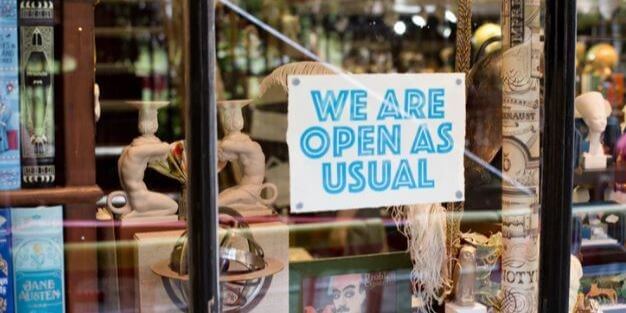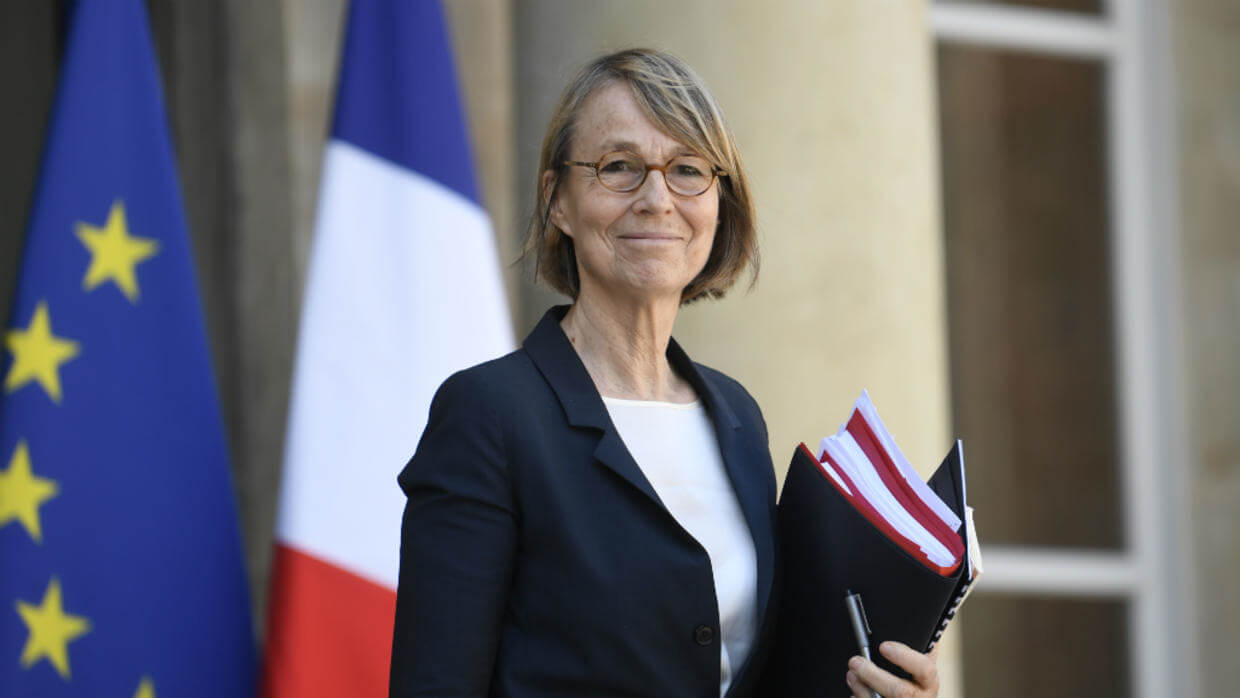Ever wondered what bookseller's life looks like? Or how people come into the bookselling profession? If so, read on!
We have been excitedly following a series of digital interviews spotlighting booksellers from around the world. Hosted by Oana Doboși and Raluca Selejan, booksellers and co-owners of La Două Bufnițe, an independent bookshop in Timișoara, Romania, the ‘Booksellers revealed’ series gives an insight into the lives of booksellers and bookshops they love dearly.
In the first post of this series, we feature a transcript of a video interview (in French) with Matthieu de Montchalin, bookseller and owner of Librairie L'Armitière in Rouen, France. The video was originally published on 28 October 2020 on La Două Bufnițe’s YouTube channel.

--
Oana Doboși: Bonjour à tous, notre invité du jour est Matthieu de Montchalin, PDG de la librairie l’Armitière à Rouen, chevalier de la légion d’honneur, président du Syndicat national de la Librairie Française de 2011 à 2017 et, depuis cette année, adjoint au maire de Rouen.
Matthieu de Montchalin bonjour ! Merci d’avoir accepté notre invitation pour cet entretien dans le cadre de notre projet Portret de libraire.
Matthieu de Montchalin: Merci beaucoup de m’avoir invité
Oana Doboși: Je sais que vous avez repris la librairie l’Armitière de Rouen en 1996. Pourquoi cette décision de devenir propriétaire d’une librairie indépendante ? Et dans quelle mesure avez-vous été influencé par le fait que votre père et votre grand-père étaient eux-mêmes libraires ?
Matthieu de Montchalin: Vous avez déjà répondu à la question. En fait j’ai toujours voulu être libraire, mais comme mes parents m’ont toujours dit de suivre une autre voie, j’ai fait une école de commerce. J’ai commencé à travailler pour un grand groupe, Danone, et après un an je me suis rendu compte que cela ne me plaisait pas du tout. Ce qui m’intéressait en fait, c’était la librairie. J’ai donc intégré un groupe de libraires indépendants à Paris dont faisait partir l’Armitière, et en 1996, sachant que la librairie était à vendre, je suis allé à Rouen rencontrer son propriétaire avec qui j’ai discuté pendant une très longue soirée pour arriver à un accord. 15 jours plus tard j’ai débarqué à Rouen. Pour moi c’était une décision naturelle, je savais que ça se finirait comme ça.
Oana Doboși: La librairie l’Armitière est une librairie généraliste spécialisée dans des thèmes comme les beaux-arts, le journalisme, l’universitaire. Elle a fêté son 57e anniversaire cette année non ?
Matthieu de Montchalin: Oui, c’est cela
Oana Doboși: Et elle compte aujourd'hui une équipe de 38 libraires ?
Matthieu de Montchalin: Oui
Oana Doboși: Comment choisissez-vous vos libraires ? Quel est le portrait d’un libraire qui travaille chez l’Armitière ?
Matthieu de Montchalin: Alors, d’abord c’est forcément quelqu’un qui aime lire. Ça paraît évident mais j’ai trop souvent vu dans des chaînes de magasins qui vendaient des livres des gens pas du tout intéressés par la lecture. Pour moi c’est vraiment la base indispensable, être passionné par le livre. La librairie est un métier avec beaucoup de manutention, debout toute la journée, impossible de lire à ce moment. Les gens pensent que nous lisons en journée, mais non, pas le temps. On lit le soir, après le travail. Si ce n’est pas une passion vous ne ferez pas ce métier longtemps. Et vous le savez bien parce que vous c’est ce que vous faites aussi.
Dans une librairie, tous doivent être des passionnés du livre. Les libraires bien sûr, mais aussi les comptables, les gens à l’accueil, les web masters. C’est l’ADN obligatoire, et sans cela, inutile de travailler dans une librairie.
Oana Doboși: Je suis tout à fait d’accord
Matthieu de Montchalin: Ensuite j’ai une autre technique qui consiste à faire rentrer dans l’équipe, des personnalités différentes de celles qui y sont déjà. Ça ne sert à rien d’avoir 38 personnes qui se ressemblent parce que les clients eux, ne se ressemblent pas. J’accepte que vous appréciiez mes conseils en littérature policière, mais que mes avis en littérature étrangère ne vous intéressent pas. Moi j’aime la littérature allemande et américaine, alors que leur préférez peut-être les auteurs italiens et espagnols. Il faut donc à côté de moi dans la librairie, quelqu’un capable de vous guider dans les domaines que vous aimez. Quand on a la chance d’avoir une grande équipe il faut qu’elle soit aussi diversifiée que notre clientèle. Je vais vous donner un exemple : là on vient d’accueillir de jeunes recrues. L’Armitière n’était pas très spécialisée en mangas, car historiquement on ne s’y était pas vraiment intéressés et aucun de nos libraires n’aimait ce genre. J’ai voulu que les jeunes qui rentrent dans l’équipe cette année soient tous des fous de mangas, qu’ils soient passionnés par ça. Pourquoi ? Parce que je ne voulais pas reproduire le même modèle, je voulais que cette équipe propose quelque chose de neuf. Ils sont arrivés début septembre et depuis qu’ils sont là le chiffre d’affaire du rayon mangas a été multiplié par 3. Les clients ont tout de suite reconnu qu’ils avaient en face d’eux des gens jeunes, certes, mais des passionnés. Cela me conforte dans l’idée qu’il faut une équipe aussi diversifiée que possible.
Oana Doboși: Super stratégie, et je pense que nous devrions l’appliquer ici aussi à l’avenir. Selon vous quelle est la meilleure journée pour un libraire ? Et la pire ?
Matthieu de Montchalin: Alors, l’actualité me fait dire que la pire journée pour un libraire est la veille du jour ou le Président de la République française va annoncer un confinement.
La plus belle journée, je crois que ce sont les journées de Noël car on vend tous les types de livres à des gens heureux de les acheter et de les offrir. Et ça c’est la récompense suprême pour les libraires. Autre moment merveilleux, c’est quand vous voyez des enfants de 4/5/6 ans, des petits qui parfois ne savent pas lire ou apprennent. Quand vous les voyez découvrir le rayon jeunesse de la librairie vous avez l’impression que c’est chaque fois Noël pour eux. Leurs yeux qui pétillent font que la plus belle journée du libraire que je suis.
Oana Doboși: Vous avez donc aussi un rayon jeunesse ?
Matthieu de Montchalin: Oui, on a un très gros rayon jeunesse puisqu’on y propose plus de 20 000 titres différents en français, ce qui place ce rayon de l’Armitière au rang des 5 plus importants en France.
Oana Doboși: On sait que la France compte plus de 3000 librairies indépendantes, pourquoi une librairie indépendante est-elle importante pour une ville ou une communauté ?
Matthieu de Montchalin: Si l’on compte plus de 3000 librairies indépendantes vous le savez c’est grâce à la loi sur le prix unique du livre qui fait que dans la plus grande des librairies, la plus vaste des Fnac ou la plus petite des librairies, le livre coûte la même chose. La concurrence ne se fait pas sur le prix mais sur le service, le conseil, la proximité. Ça c’est le premier point important. Le deuxième point important dans ce domaine c’est qu’une librairie dans une ville c’est d’abord une offre commerciale. On a envie d’avoir des boulangeries, des boucheries, un tas de commerces, et la librairie en fait partie. En outre, une librairie est un endroit privé certes, mais où on organise des manifestations culturelles. A l’Armitière nous organisons par exemple, sauf pendant la période du COVID-19 malheureusement, à peu près 3 rencontres par semaine, soit entre 120 et 150 rencontres par an. Les auteurs qui viennent à la librairie parler de livres c’est parfois des événements très discrets, mais quand vous recevez Amélie Nothomb ce sont des centaines de personnes qui se déplacent. Même chose si vous accueillez un prix Goncourt ou un auteur de manga et de bande dessinée .
Ce qui rend ce commerce différent c’est d’abord le produit vendu, un objet culturel, un objet important qui participe à la diffusion du savoir, aux loisirs, à la culture générale. Dans les librairies à la française, c'est à dire les librairies générales, vous avez 1000 occasions de rentrer. Parce que vous avez besoin de livres scolaires, parce que vous avez envie de lire un livre ce week-end, parce que vous avez besoin de livres de voyages. D’ailleurs je dois venir chez vous mais en ce moment ce n’est pas très pratique
Oana Doboși: L’année prochaine
Matthieu de Montchalin: L’année prochaine je viendrai chez vous et je répondrai à vos questions installé sur le canapé là, juste à côté de vous.
Oana Doboși: Oui
Matthieu de Montchalin: Il y a 1000 raisons de rentrer dans une librairie et ce sont ces 1000 raisons qui font que c’est un commerce extrêmement vivant, extrêmement emblématique. D’ailleurs les villes qui n’ont plus de librairies déploient beaucoup d’efforts pour en recréer une.
Oana Doboși: Vous avez anticipé un peu ma question suivante qui portait sur la loi du prix unique du livre. L’année prochaine le marché français du livre célèbrera les 40 ans de cette loi. En Roumanie malheureusement nous n’avons pas une telle réglementation. Quels ont été les bénéfices d’une telle loi pour la librairie indépendante et, au sens plus large, pour les auteurs et les éditeurs ?
Matthieu de Montchalin: Pour les libraires c’est évident. S’il y a beaucoup de libraires indépendants en France c’est grâce à la loi sur le prix unique du livre. Sans cette loi il n’y aurait que des chaînes comme en Pologne, comme aujourd'hui en Italie (bien qu’il y ait une espèce de loi sur le prix unique mais elle s’est installée très tard et elle n’est pas bien faite), comme en Angleterre par exemple où vous n’avez pratiquement plus de librairie indépendante, vous en avez peut-être 50 et vous avez des milliers de chaînes. Vous allez me dire « ce n’est pas très grave, un livre reste un livre » mais, pour la diversité de l’offre éditoriale c’est très important d’avoir des libraires indépendants. Vous le savez bien, un libraire indépendant donne une couleur à sa librairie, il y a une ligne éditoriale, il met en avant certains auteurs, certaines langues de traduction, certains types d’ouvrage…. Une autre librairie qui va s’installer à 300 mètres de vous fera autrement. Et tant mieux, puisque les clients touchés seront différents, comme les livres proposés. Bref vous allez donner plus d’espace à plus de livres. Une chaîne, c’est la même chose partout tout le temps, et surtout il y a des critères de rentabilité qui font qu’on cherche absolument à n’avoir que les bestsellers. Vous vous n’avez pas que les bestsellers.
Oana Doboși: Non.
Matthieu de Montchalin: C’est ça qui compte et c’est ça qui aide les auteurs et les éditeurs. Pourquoi est-ce intéressant pour un jeune auteur d’être lancé en France aujourd'hui ? Parce qu’il sait qu’il peut trouver 3000 vitrines qui acceptent de prendre des risques, qui acceptent de mettre en avant de nouveaux auteurs. Les chaînes vont en sélectionner 1, peut-être 2 ou 3. Puis elles diront 3 c’est bien, le reste on va le mettre sur les valeurs sûres, sur les bestsellers. C’est très important pour les jeunes auteurs de démarrer en librairie indépendante, et puis ils pourront percer, devenir des bestsellers et pour le coup ils seront vendus partout, dans les hypermarchés, dans les relais dans les gares, sur internet, sur Amazon ou dans les magasins de chaînes.
Pour les éditeurs c’est la même chose, un éditeur ne peut pas avoir que des bestsellers, il a besoin de faire démarrer de nouveaux concepts, de séduire avec de nouveaux auteurs ou alors de publier des choses qui ont un tout petit lectorat. Il n’y a que les libraires indépendants qui font cet effort, qui vont continuer à mettre en avant la poésie, les livres d’art ou les auteurs inconnus. Pour le paysage culturel et éditorial français, c’est essentiel qu’il y ait autant de librairies. C’est la même chose que dans le cinéma. En France nous avons la chance d’avoir énormément de salles de cinéma, notamment des salles ayant le label « Art et Essai » et qui projettent par exemple des films roumains, ou des films complexes et, pas uniquement Star Wars et Mission impossible. Ce sont des salles de cinéma qui vont faire un effort culturel. Les libraires indépendants font cet effort culturel, cet effort de découverte et d’originalité.
Oana Doboși: oui je sais qu’en France il y a aussi le label « librairie indépendante ».
Matthieu de Montchalin: Oui « librairie de référence ».
Oana Doboși: Comment on peut obtenir ce label en France ?
Matthieu de Montchalin: Il y a une commission sous l’égide du ministère de la culture et du centre national du livre, qui fixe des critères : il faut avoir une vraie librairie et pas juste en entrepôt, proposer un certain nombre de nouveautés, avoir des libraires qualifiés, formés, intervenir sur beaucoup de secteurs différents et pas uniquement un seul et surtout il faut faire des animations, mettre en avant des éditeurs et de nouveaux auteurs. Ce label quand on l’obtient dure 3 ans. Donc tous les 3 ans il faut recommencer les démarches un peu comme une norme qualité. Cela nous oblige à nous maintenir toujours au même niveau d’exigence et ça je trouve que c’est très bien.
Oana Doboși: vous avez été longtemps à la tête du Syndicat national de la Librairie française où vous avez initié beaucoup de projets importants pour les libraires et les librairies indépendantes. On sait que chaque librairie indépendante à sa propre personnalité mais en même temps les libraires indépendants doivent avoir une voix commune pour faire face au numérique et maintenant à la crise sanitaire. Comment se manifeste la solidarité entre les libraires français ?
Matthieu de Montchalin: Il y a plusieurs questions. Je dis toujours qu’un libraire indépendant ne doit pas être un libraire isolé. Je suis indépendant dans le choix des livres qui rentrent dans ma librairie, en fonction de mes clients, de mes goûts, de la place dont je dispose. Il y a plein de critères mais c’est moi qui choisis, c’est ça la marque de l’indépendance. Ce n’est pas quelqu’un à Paris qui décide que l’Armitière peut vendre ce livre et pas celui-là. Ça c’est la définition de l’indépendance et c’est essentiel.
Mais je ne dois pas être tout seul d’abord parce qu’il y a de nombreux domaines dans lesquels on a intérêt à être ensemble. Par exemple pour négocier avec les pouvoirs politiques, avec les éditeurs, avec le ministère de la culture. Il y a plein de moments où on est plus forts parce qu’on agit ensemble, et ce dans tous les domaines, tous les pays, tous les secteurs du monde. A plusieurs on réfléchit mieux, de manière plus originale.
Moi j’ai toujours mis en avant le collectif, la réflexion à plusieurs libraires voire plusieurs centaines de libraires. C’est difficile car, par définition, le libraire indépendant a parfois tendance à être individualiste et vouloir agir seul. Il faut lutter contre ça. Le travail du Syndicat est de dire que si chacun a dans sa librairie une politique d’achat et une politique éditoriale qui lui sont propres, pour beaucoup d’autres choses comme l’achat de sacs en papier, le transport, les sites internet, il n’y a pas du tout intérêt à faire ça tout seul car ça va coûter beaucoup plus cher. Ce discours que nous tenons a plus de mal à passer auprès des libraires quand tout va bien. Ils se demandent alors à quoi sert le Syndicat. Et puis quand vient une crise, tout le monde trouve que le Syndicat c’est une très bonne idée. Avec cette pandémie, et n’étant plus à sa tête, je peux le dire ouvertement, le Syndicat, Xavier Moni son Président et toute l’équipe, ont très bien négocié avec le ministère de la culture, pour faire en sorte que les libraires ne soient pas oubliés dans le plan de relance du gouvernement français, et continuent à exister. D’autant plus que les clients nous ont montré à la fin du confinement qu’ils avaient envie de venir dans nos librairies. J’espère que le second confinement qui va commencer demain ne va pas casser cette dynamique.
Oana Doboși: Demain va commencer le second confinement en France ?
Matthieu de Montchalin: Ce soir le Président va annoncer un nouveau confinement, on ne sait pas encore s’il sera très sévère ou pas. Il va commencer probablement ce soir ou ce week-end et va durer plus d’un mois donc tout près de Noël, ce qui est très dur pour les libraires. Mais l’épidémie en France explose comme j’imagine en Roumanie, et cette deuxième vague est encore plus dure que la première. Il est vraiment important de la casser sinon les conséquences seront terribles pour l’économie et surtout pour la santé des gens. Moi je n’ai pas du tout envie que mes clients meurent du COVID-19.
Oana Doboși: Bien sûr. Comment la librairie l’Armitière a-t-elle résisté aux difficultés imposées par la gestion de la pandémie ?
Matthieu de Montchalin: D’abord on n’a pas eu beaucoup le choix au milieu du mois de mars. On s’est mis en capacité de redémarrer dès le mois de mai de la meilleure manière possible. Ça s’est plutôt bien passé et je ne crois pas qu’il y ait beaucoup de librairies qui ont fait faillite à la sortie du premier confinement. Là où ça va être beaucoup plus difficile c’est avec le nouveau confinement puisqu’il arrive à Noël qui est la période la plus importante pour toutes les librairies. Là ça va être plus compliqué car je pense que le risque est grand, plus fort. Mais les librairies se sont adaptées, on a beaucoup développé de clic and collect avec nos sites internet, on a essayé d’aménager des systèmes de livraison à vélo ou des systèmes de livraison par la poste.
On a beaucoup travaillé sur des conseils sur internet, sur nos pages Facebook, Twitter, Instagram. On a maintenu le lien avec nos clients et dès qu’on a réouvert notre site internet à la fin du confinement, on a eu énormément de commandes. Cela veut dire que les clients sont très attachés à la libraire de l’Armitière mais aussi à leur librairie en France et qu’ils nous ont fait confiance. J’espère qu’ils vont continuer à le faire. Le problème c’est que c’est très important de réussir Noël, c’est ça qui sauve une année. Là je suis assez inquiet à l’idée qu’on va commencer en novembre un confinement pour 4 à 6 semaines.
Oana Doboși: Donc juste avant Noël.
Matthieu de Montchalin: Oui, juste avant noël. Ce n’est la faute de personne, on n’y peut rien et il faut faire avec. Moi je suis plutôt quelqu’un d’optimiste et je pense qu’à la fin de la pandémie nos clients seront toujours là, qu’ils auront envie de soutenir la librairie indépendante et que pour eux c’est très important que les centres-villes ne meurent pas et qu’on y garde la diversité des commerces. Je pense qu’on va trouver un vaccin, que l’année prochaine on va sortir de cette pandémie, la seule chose que j’espère c’est qu’un maximum de librairies n’auront pas abandonné en cours de route et n’auront pas perdu toutes leurs forces.
Encore une fois j’estime que l’on a bien géré le premier confinement : le gouvernement, les libraires, les clients. Ça va être pareil pour le deuxième, je suis plutôt confiant.
Oana Doboși: Quelles étaient les mesures prises par le ministère de la culture pour aider les librairies ?
Matthieu de Montchalin: Les mesures sont des mesures de chômage partiel. Nous avons pu mettre nos salariés au chômage pendant le confinement et c’est donc l’Etat qui a payé. On nous a décalé ou supprimé des impôts ou des charges, et puis l’Etat à demandé aux banques de prêter beaucoup d’argent aux entreprises pour qu’elles conservent leur trésorerie et qu’elles puissent redémarrer. Cet argent il faudra la rendre c’est sûr et ce sera certainement un peu compliqué, mais au moins ça nous a permis de tenir parce que pour une entreprise le plus risqué c’est de ne pas avoir de trésorerie, de ne pas pouvoir payer les nouveaux achats de livres, les salaires, les loyers ou les taxes. Donc le gouvernement a vraiment bien fait les choses en faisant en sorte que tous les libraires soient capables de tenir et d’ailleurs je n’ai pas d’exemple en tête de libraires qui ont fait faillite à la sortie du confinement. Il y en a peut-être mais c’était probablement des librairies qui allaient très mal avant le confinement ou des libraires qui ont eu envie d’arrêter parce qu’ils étaient âgés ou parce qu’ils avaient envie de changer de métier.
Oana Doboși: Quelles sont les solutions pour la librairie pour résister aujourd'hui face au développement du numérique ?
Matthieu de Montchalin: Ça dépend de ce que vous entendez par numérique
Oana Doboși: Amazon
Matthieu de Montchalin: Si vous parlez des ventes de livres physiques sur Amazon, là c’est le mode d’achat qui est numérique mais le livre reste en version papier. C’est difficile de résister parce qu’Amazon est très très fort, c’est le meilleur logisticien du monde, il a énormément d’argent et donc est capable de déployer beaucoup de moyens pour conquérir un marché. Mais, si l’on prend le cas particulier de Rouen, d’abord on a beaucoup de librairies en centre-ville et de nombreux habitants viennent faire leurs courses une fois par semaine et passent devant ma librairie. Bien sûr ils peuvent commander sur Amazon mais ils peuvent aussi rentrer dans une librairie qu’ils connaissent, acheter un livre, l’acheter au même prix puisque ce n’est pas moins cher sur Amazon, c’est ça la grande force en France. Premier point il n’y a pas de différence sur les prix.
Deuxième point, au niveau du pays cette fois, il y a beaucoup de librairies dans toutes les villes, y compris les villes moyennes. Troisième point, plus subtil et probablement pas le cas de tous les acheteurs, mais vous savez qu’aujourd’hui il y a quand même un problème de taxes qui ne sont pas payées par Amazon. Amazon n’est pas un très bon élève pour payer les impôts. Ce n’est pas non plus un très bon élève en matière de droit social, de respect des salariés et sûrement pas la meilleure solution en matière d’environnement avec la livraison de tous les colis à domicile par camions, ce qui représente des milliers de kilomètres et une empreinte carbone élevée. Certains clients sont attentifs à ça, et veulent acheter mais pas à n’importe quel prix social, écologique, ou au détriment de leurs valeurs. Quand vous achetez un livre à l’Armitière, je paie la TVA donc indirectement le participe au financement des routes, des écoles et des hôpitaux. Et les hôpitaux on en a besoin en ce moment. Quand j’achète un livre chez Amazon je ne sais pas trop s’il finance les routes que ses camions utilisent, ou l’école de mes enfants et encore moins les hôpitaux.
Ne pas payer d’impôt en France cela devient à un moment un choix de société. Donc Amazon va exister, va devenir probablement de plus en plus fort, mais je ne pense pas qu’il va éliminer tout le monde ? Je crois que leur progression va être importante encore pendant plusieurs années, mais il va y avoir une forme de résistance qui va se mettre en place et le COVID-19 va peut-être nous aider. Les gens redécouvrent le plaisir d’acheter local, de ne pas voyager à l’autre bout de monde pour un week-end mais d’essayer de se rapprocher de sa région. Et ce qui marche pour les produits alimentaires marche aussi pour les livres. Les gens sont conscients que ce qui se passe autour d’eux a de la valeur, est important et ils ont compris que la solidarité locale doit être préservée. Vous avez parlé tout à l’heure du mot « communauté » qui est très utile aux Etats-Unis, pas très utilisé en France mais je crois que c’est en train de monter. La communauté des gens qui fréquentent une libraire, la communauté de mon quartier, de ma ville. Les gens avaient peut-être oublié ces notions, en tout cas dans les grandes villes, et ils sont en train de les redécouvrir. Je pense que les librairies défendent les bonnes valeurs par rapport à ça.
Oana Doboși: merci Matthieu de Montchalin pour cet entretien. Personnellement j’ai beaucoup aimé les libraires françaises indépendants qui au début du premier confinement disaient que les dinosaures avaient disparu, mais pas eux. Restons optimistes et on vous attend à Timișoara dans notre librairie.
Matthieu de Montchalin: Merci beaucoup de votre invitation, je suis très content de suivre votre librairie depuis 4/5 ans, on s‘est souvent rencontrés à Francfort. Bravo pour votre français qui est parfait.
Oana Doboși: Merci !
Matthieu de Montchalin: Et je suis ravi de savoir que la littérature française a une petite place à Timișoara grâce à vous et je sais que c’est important. Je vous promets que dès qu’on pourra à nouveau circuler je viendrai vous rendre visite. Merci beaucoup pour votre invitation.
Oana Doboși: Merci, au revoir !
Matthieu de Montchalin: Au revoir !
--
This post was shared with permission.
.png)
.png)















